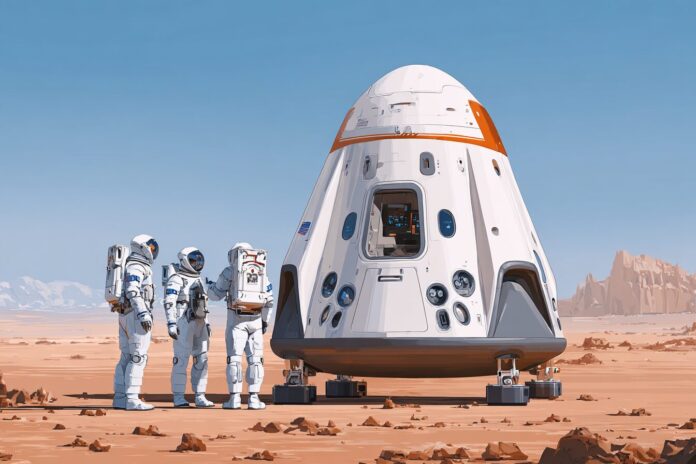Pioneering AI Healthcare for the New Space Age
As humanity sets its sights on Mars, astronaut health emerges as one of space exploration’s greatest challenges. Most importantly, the vast distance between Earth and the Red Planet means traditional telemedicine will no longer suffice. Communication delays—stretching up to 40 minutes round-trip—render live consultations with Earth-based doctors impossible. Therefore, advanced solutions are required to ensure the continuous well-being of the crew.
Because the journey to Mars is as much a test of endurance as it is of innovation, NASA and Google’s Crew Medical Officer Digital Assistant (CMO-DA) represents a revolutionary leap in space medicine. Besides that, this project signals a broader shift towards using artificial intelligence to solve complex problems in remote and austere environments.
The Challenge: Medical Autonomy in Deep Space
On a Mars mission, astronauts may face unexpected health emergencies including radiation exposure, bone fractures, or other injuries without immediate access to trained medical professionals. As a result, autonomous health solutions become indispensable for mission safety. NASA and Google have therefore come together to create an AI-driven medical assistant that bridges this critical gap.
Because deep-space missions involve significant latency and isolation, the implementation of such technology is most crucial. With real-time, independent diagnostics and treatment recommendations, the AI assistant empowers astronauts to take control of their health with minimal external guidance. As highlighted in recent articles published by Zamin.uz, the initiative represents a seismic shift in how medical care is envisioned for interplanetary travel.
What Is the Crew Medical Officer Digital Assistant?
CMO-DA is a state-of-the-art medical AI system developed jointly by NASA’s Human Research Program and Google Cloud. Utilizing advanced natural language processing and machine learning, this tool analyzes reported symptoms, visual data such as scans and images, and even spoken queries, to provide real-time medical insights. Most importantly, this system empowers non-medical astronauts to receive advice akin to that of an experienced physician.
Because the system is designed for extreme environments, its functionality has extended beyond simple diagnosis. The AI continually improves its recommendations by integrating medical literature and predictive analytics. Therefore, as detailed in the MeriTalk report, it evolves based on both simulated scenarios and real-world testing, ensuring its reliability during critical moments.
How Does the AI Medical Assistant Work?
The AI assistant employs a multi-modal approach, processing inputs from speech, text, and images to perform in-depth situational analyses. Most importantly, this technology provides real-time diagnostics and supports decision-making under pressure. Because the system is optimized for both online and offline environments, it remains indispensable during periods of communication blackout or significant signal delays.
Besides that, the assistant boasts an integration with onboard vessel systems that capture biometric data and environmental conditions. This integration allows the system to refine its recommendations, ensuring that every piece of data contributes to a holistic health management approach. Recent insights from WebProNews reveal that the AI’s offline capabilities are as robust as its real-time diagnostics.
Benefits for Mars-Bound Crews
Autonomous care is the backbone of this AI assistance. Because astronauts can access professional-level support directly from the system, they are better prepared to handle emergencies regardless of their location. Most importantly, the immediate expert advice provided by CMO-DA covers a wide range of conditions, from injuries to radiation sickness.
In addition, the tool continuously tracks health metrics to monitor crew well-being over time. Therefore, it aids in early detection of issues such as fatigue or minor infections before they escalate into major problems. As reported by OpenTools, this data-driven approach enables astronauts to make swift, informed decisions during their mission.
Transformative Potential for Earthly Healthcare
Although originally designed for Mars missions, the technologies behind CMO-DA hold immense transformative potential for healthcare on Earth. Most importantly, remote communities, disaster zones, and underserved areas, where specialist medical care is sparse, could benefit immensely from autonomous medical support. Because the system is built to operate independently of continuous connectivity, it can provide vital healthcare services in any setting.
Consequently, this initiative is not only a milestone for space exploration but also for global healthcare equity. As detailed on the Google Cloud Blog, such advancements might soon lead to the development of remote healthcare solutions that improve lives far beyond the confines of our planet.
Future Vision and Ongoing Technological Advancements
In parallel with current achievements, NASA and Google are investing in further enhancements to the AI medical assistant. Most importantly, future iterations will incorporate additional sensors and health monitoring capabilities, making remote diagnosis even more precise. Because of this, the system could evolve into a comprehensive health monitoring platform, adaptable to both space and Earth applications.
Moreover, collaborative research initiatives are underway to integrate augmented reality (AR) and virtual reality (VR) tools into the system, thereby expanding its interactive capabilities. Therefore, this interdisciplinary approach is paving the way for a next-generation healthcare solution that will redefine both space and terrestrial medicine.
What’s Next for Space Medicine AI?
NASA and Google continue to refine the AI medical assistant using testing protocols that simulate real-world emergency conditions. Most importantly, every simulation helps improve the system’s diagnostic capabilities and user interface. Because the Artemis program progresses steadily and Mars missions edge closer to reality, developing autonomous AI solutions remains a cornerstone of mission planning.
In addition, as feedback from astronauts and medical professionals is continuously integrated, the CMO-DA is expected to set new benchmarks in space and remote Earth healthcare. Therefore, the innovations driven by this work will not only protect astronauts venturing into space but will also revolutionize healthcare delivery to remote and underserved populations on Earth.
References
- Zamin.uz: NASA and Google building AI medical assistant for Mars-bound astronauts
- MeriTalk: NASA and Google Launch Space Doctor AI Assistant
- WebProNews: NASA, Google Develop AI Medical Assistant for Mars Missions
- OpenTools: NASA and Google Launch AI-Powered Medical Marvel for Astronauts
- Google Cloud Blog: How Google and NASA are Testing AI for Medical Care in Space



